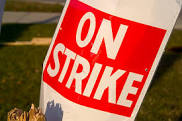One may wonder and often times question the validity or otherwise of an action, where the motive of such act is rather inconspicuous. Situations as such, call for probe and questioning, even though those questions may not be answered. It is however, better to speak up for posterity sake than to remain silent. Hence this article.
In this article, we shall analyse critically, the validity or otherwise of the recent strike action commenced on the 14th November, 2023 and for proper appraisal of this article, the following questions on the alleged assault on the president of the Nigerian Labour Congress (NLC) and the consequent strike action would be answered.
- Was the assault on the Labour leader lawful?
- Was the restraining order issued by the National Industrial Court of Nigeria (NICN) lawful and correctly applied?
- Was the reason for the labour strike action cogent?
- What are the effects of questions 1-3 on the masses (Nigerians)?
- What are the ways forward?
At a press conference in Abuja on Friday, November 10, 2023, the President of the Nigerian Labour Congress, Joe Ajaero gave account of how he was beaten in Imo State by alleged thugs. He stated that upon his arrest by the police in Owerri, Imo State, he was handed over to thugs who assaulted and dragged him like a common criminal. His offence according to his account, was meddling in Imo state politics and attempts to blackmail the state government with workers salary. Interestingly, all these happened within the period of the Imo state Governorship election.
In addition to this, there have been several attempts to embark on industrial strike by the Nigerian Labour Congress, owing to depreciation of the economic welfare of workers. However, these attempts have time again been forestalled by the government through unworkable agreements and meetings. The courts have not been left out, as restraining orders kept flying from their cubicles.
Curioisly, on Friday, November 10th, 2023, the President of the National Industrial Court of Nigeria (NICN), Justice Benedict Kanyip, issued an order of interim injunction restraining members of the organized labour, including the Nigerian Labour Congress (NLC), the Trade Union Congress (TUC), and their affiliates from proceeding with the strike it planned to commence on 14th November, 2023.
Was there compliance to this order? No. In fact, the proposed strike action was criticized and seen as an economic sabotage and an attempt to blackmail President Tinubu’s government. The Special Adviser to the President on Information and Strategy, on November 13th, 2023, issued a state house press conference that the assault on the Labour leader in Owerri, Imo State was due to his error and of judgment and in essence, not in national interest.
In answering question 1, assault is a crime and a tort, which may result in criminal prosecution, civil liability, or both depending on its nature. An Assault is the illegal act of causing physical bodily harm or unwanted physical contact to another person, or, in some legal definitions, the threat or attempt to do so. By the provisions of Section 170 of the Criminal Law of Lagos State, 2015,
- A person who –
- strikes, touches, moves, or otherwise applies force of any kind to the person of another, either directly or indirectly, without his consent: or
- by any bodily act, gesture, attempts or threatens to apply force of any kind to the person of another without his consent, in such circumstances that the person making the attempt or threat has actual or apparent ability to effect his purpose is said to assault that other person.
Section 172 of the Criminal Law provides for the punishment for assault.
Any person who unlawfully assaults another commits a misdemeanor and is liable on conviction, if no greater punishment is provided, to imprisonment for one (1) year.
It is clear from the above sections of the Law that the assault melted on the Labour leader was unlawful and highly unwarranted.
On question 2, the restraining order issued by Justice Benedict Kanyip, the President of the National Industrial Court is in line with the provision of the National Industrial Court of Nigeria Establishment Act.
It is trite that by the provisions of Section 7(1) and 19(a) of the National Industrial Court of Nigeria Establishment Act, the court can hear such ex-parte application and grant such ex-parte order where a strike is threatened, but yet to be commenced as in the case above.
Further to the above, a critical analyses of the above provision with that of the grund norm, the Constitution of the Federal Republic of Nigeri 1999 Constitution (as amended). Section 40 provides for Right to peaceful assembly, and it states thus:
Every person shall be entitled to assemble freely and associate with other persons, and in particular he may form or belong to any political party, trade union or any other association for the protection of his interests.
It is clear from the provision of the Constitution that the NLC has the right to commence a strike action in so far as it is the interest of justice and in a bid to protect its interest. However, the constitution has also given authority for courts to establish a governing law that would run its affairs. The established Act of the NICN as provided above is in a bid to curb misuse of rights and privileges.
On question 3 posed above, Section 34 Subsection (1) Paragraph (a) of the 1999 Constitution of the Federal Republic of Nigerian (CFRN) provides thus:
34 (1) Every individual is entitled to respect for the dignity of his person, and
Accordingly
- no person shall be subject to torture or to inhuman person or degrading treatment.
No person deserves to be tortured. If one is aggrieved by the excesses of another, the court or other dispute resolution centers should be sought for remedy. Self-help has always been condemned as it may lead to jungle justice.
As was earlier discussed in this article, the President of the Nigerian Labour Congress alleged that he was beaten and thereby sustained injury. This however is not in the general interest or be a reason to commence a strike action. There are several reasons so glaring that requires immediate attention or possible strike action. For instance, Nigeria’s inflation rate increased to 27.33 per cent in October. In fact, it increased by 0.61 percent within the space of one month this year, and 6.24 percent higher compared to the rate recorded in October 2022. Furthermore, food inflation increased to 31.52 percent as compared with 23.72 percent in October 2022. The figure shows that the Nigeria’s inflation is soaring for the 10th time in 2023. This information was disclosed by the National Bureau of statistics in the Consumer Price Index Report released on Wednesday, 15th November, 2023.
For question 4, the effects these would have on the Nigerian citizens are to the fact that the understanding of what justice stands for would be misconstrued. Breach and anarchy would be seen and perceived as the new order. People will no longer have regards for the temple of justice and may want to hijack the legal order and a genuine course.
What then is the way forward?
People should refrain from the use of self-help, which may amount to jungle justice. Adherence to the rule of law and court orders should be strongly upheld. Court orders for the restriction of lawful protest or strike should be sparingly applied for or issued base on the merit of the case. Where a breach has been occasioned, resort should be made to the court. Like in the instant case, the president of the NLC should instead of a strike action, which may be perceived as frivolous or for his self-aggrandizement, should seek redress on the basis that his Fundamental Right has been infringed. This he may do by sending an application under the Fundamental Rights Enforcement Procedure Rule while strike action should ONLY be employed where it borders on the interest of labour and public at large.





